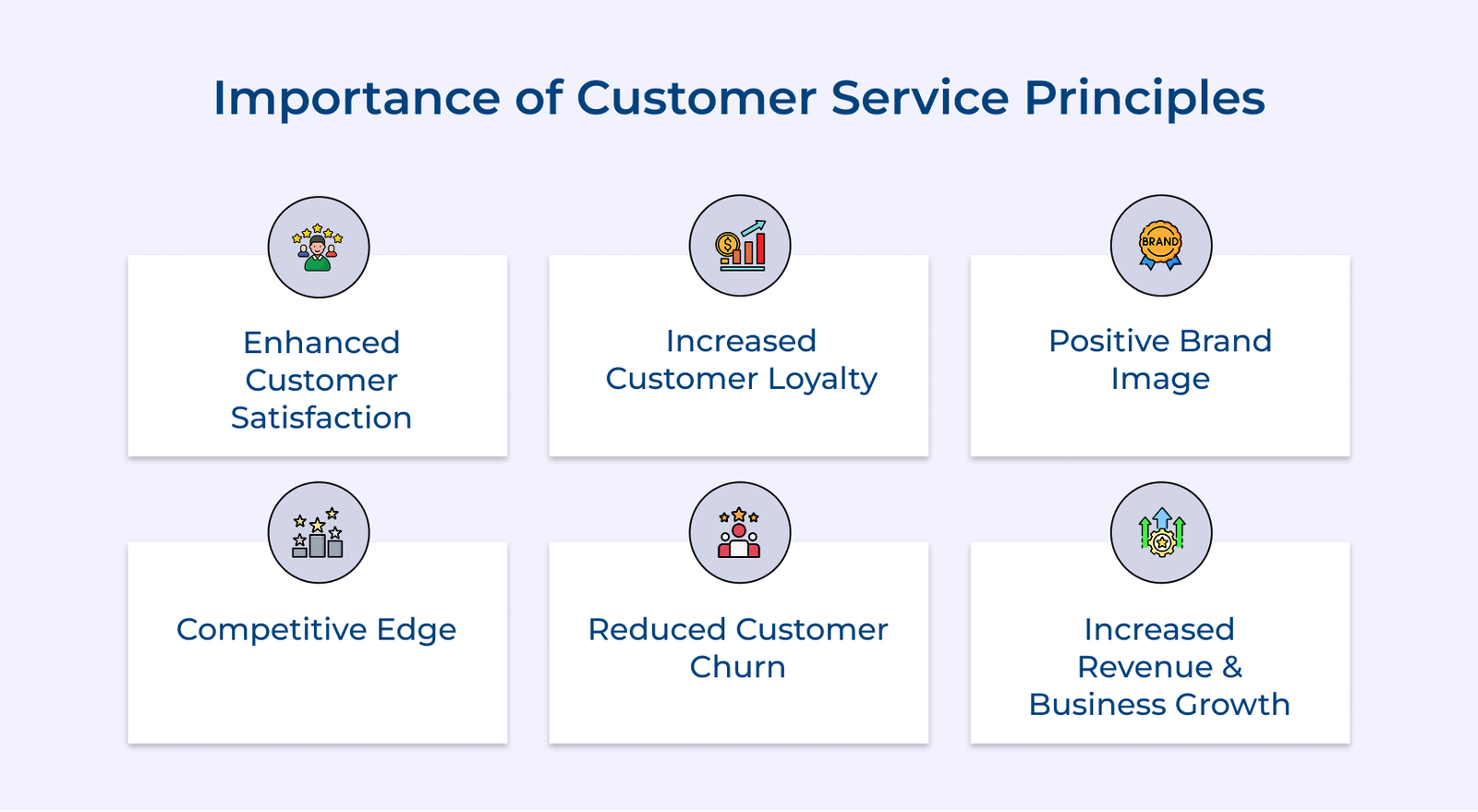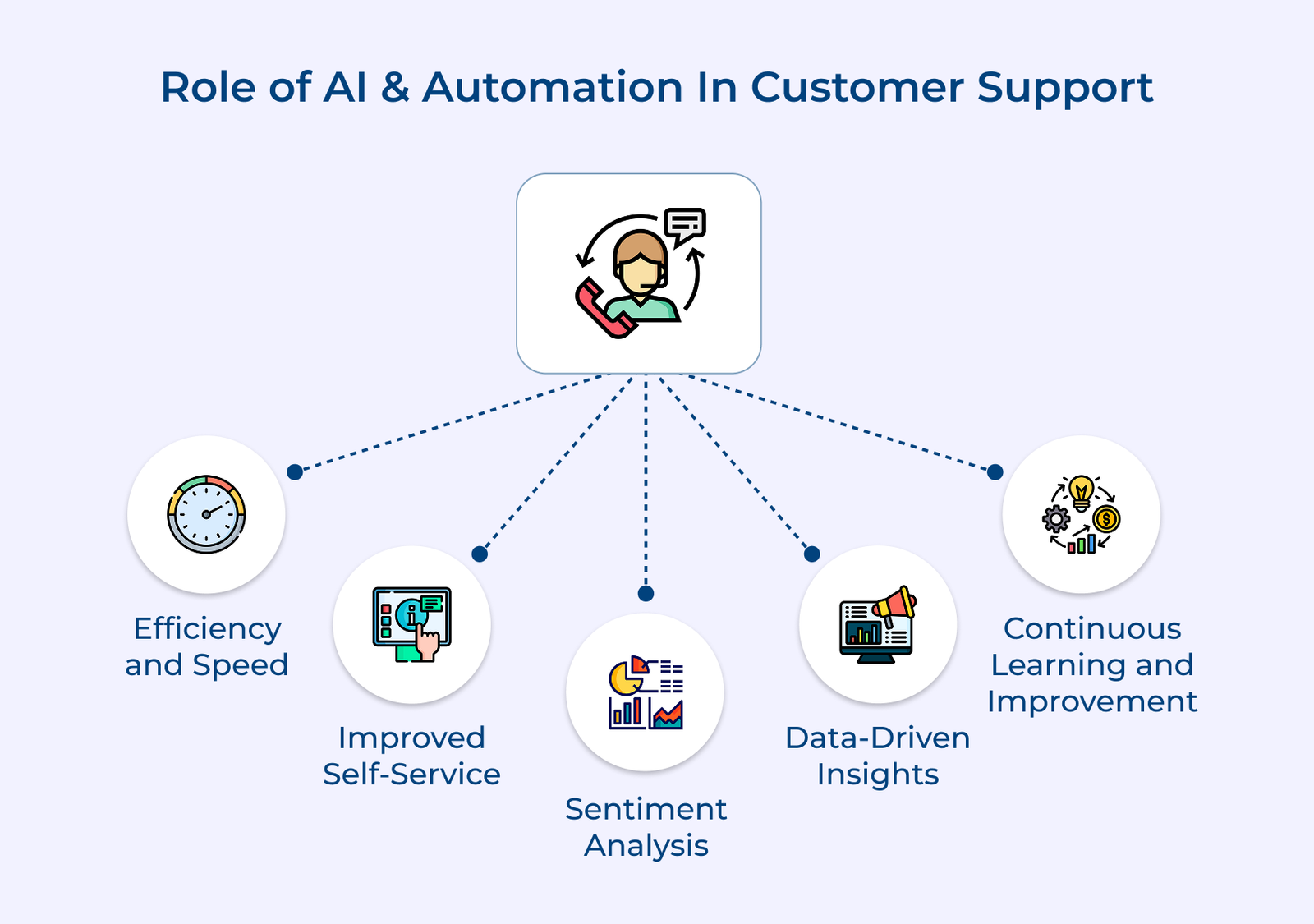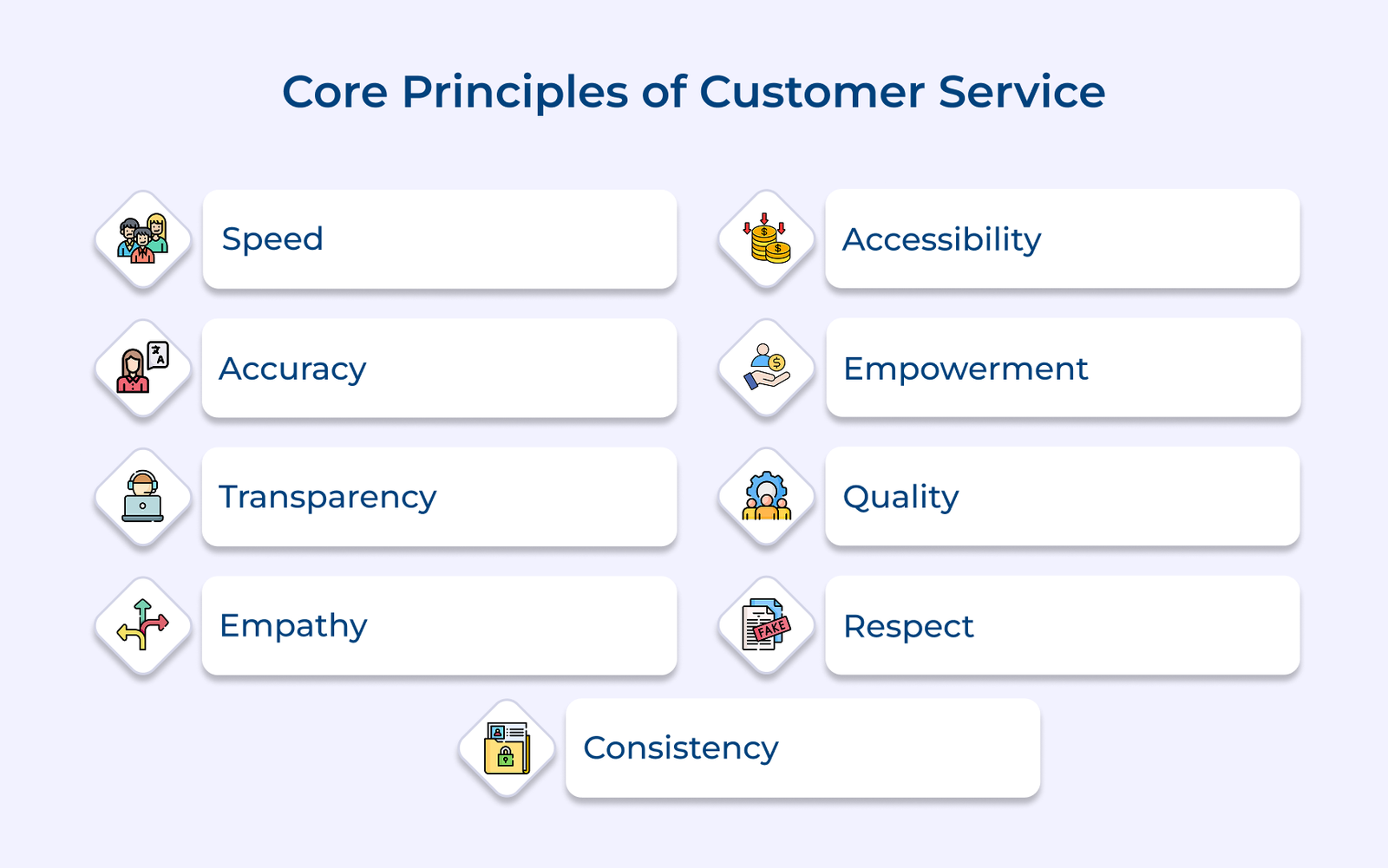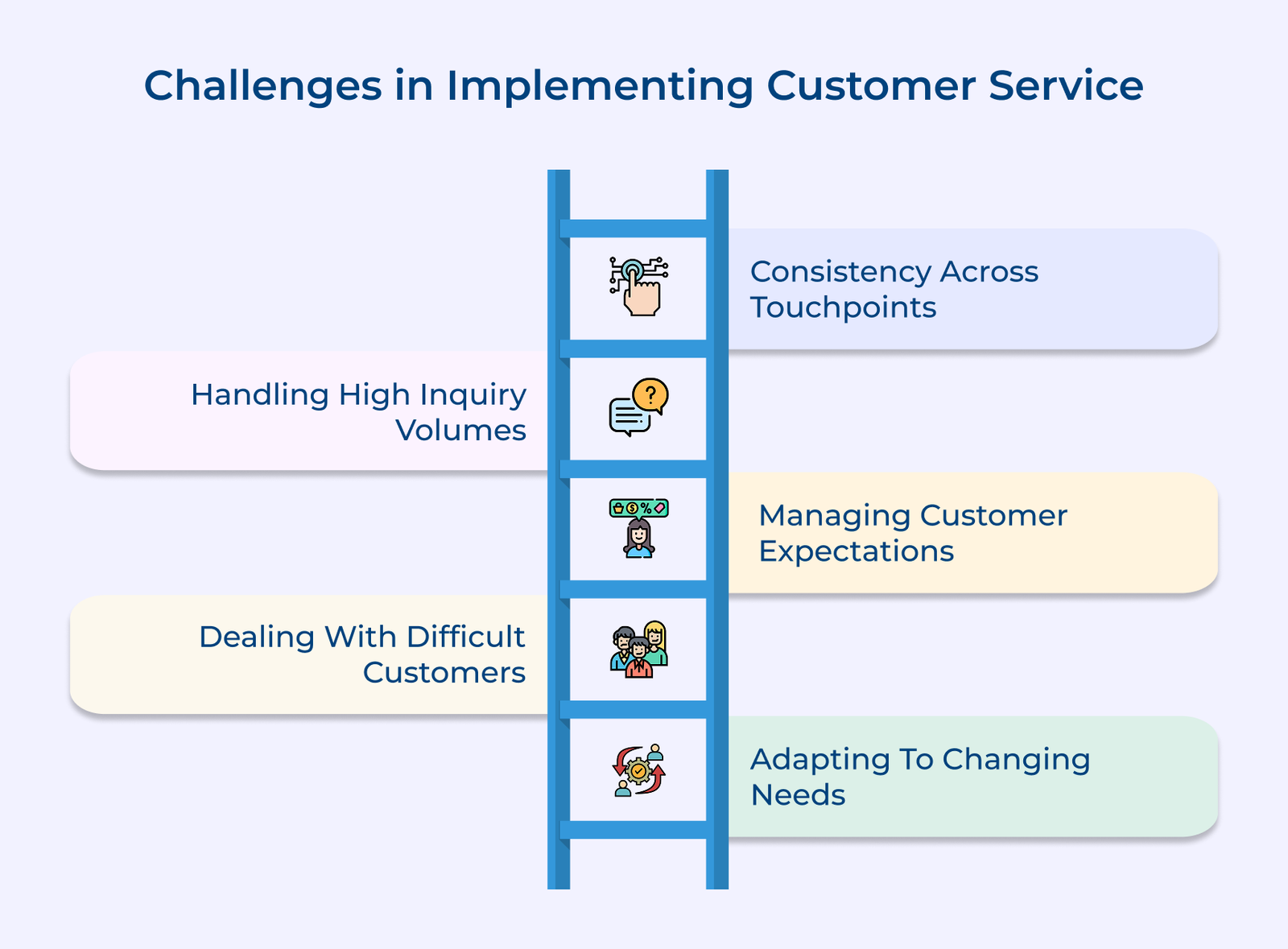1. Speed: Response with Urgency and Efficiency
Speed is a key principle of customer service. 90% of customers rate an “immediate” response as essential or very important when they have a customer service question. Prompt responses show respect for customers’ time and build trust. Quick resolutions make customers feel valued, while delays can cause frustration and harm your reputation.
Pro tips:
- Set clear response goals: Define expected response times for all channels. Aim to reply within a set timeframe, like 24 hours and strive to exceed expectations when possible.
- Streamline processes: Remove bottlenecks and implement systems that enable fast problem-solving. Use automation for routine tasks and give staff access to complete customer information.
- Empower your team: Provide employees with the tools, authority and resources to resolve issues quickly. Encourage proactive problem-solving and enhance a culture that prioritizes promptness.
2. Accuracy: Gain Knowledge About Your Products
Accuracy in customer service means having a solid understanding of your products or services. Providing correct information builds trust, helps customers make informed decisions and strengthens long-term relationships.
Key questions:
- Which features and limitations of each product should I master to answer inquiries confidently?
- How can I stay updated on product changes, updates or new releases?
- What common customer pain points or use cases should I prioritize understanding?
- How can I explain technical details in a way all customers can understand?
When customers have questions, they expect accurate and precise information. Being knowledgeable enables you to answer questions, resolve issues and help customers make informed decisions. Accuracy instills confidence in customers and reassures them that they are dealing with a trustworthy business.
3. Transparency: Initiate Transparent Communication
Transparency in customer service means providing clear, accurate information and being upfront about policies. Honest communication builds trust and strengthens long-term relationships.
Transparency establishes credibility. When customers feel that a company is being transparent, it creates a sense of reliability. It encourages customers to believe in the company’s products and instills confidence in their purchasing decisions.
Actionable tips:
- Provide clear information: Share accurate, up-to-date details about products or services. Avoid jargon to prevent confusion and help customers make informed choices.
- Maintain open channels: Allow customers to ask questions, give feedback and voice concerns. Multiple contact points encourage dialogue and ensure expectations are understood.
- Acknowledge mistakes: Admit errors, apologize sincerely and offer solutions. Honesty reassures customers and helps maintain loyalty even when things go wrong.
4. Empathy: Show Genuine Care
Empathy in customer service means understanding a customer’s feelings and perspectives. It helps build trust, strengthens relationships, and improves the overall experience. Empathy is crucial in customer service because it cultivates trust and enhances the customer experience.
When customers feel that their concerns are understood and acknowledged, they are more likely to develop a positive perception of the company. Empathy improves problem-solving and conflict resolution by helping representatives address issues with a genuine understanding of the customer’s perspective..
Pro tips:
- Listen with focus: Give customers your full attention. Reflect their concern back so they know you’ve understood.
- Personalize your response: Address their specific situation rather than offering generic solutions. It shows care and commitment to resolving their problem.
5. Accessibility: Address Customers’ Queries Promptly
Addressing customer queries promptly is a core principle of customer service that plays a vital role in ensuring customer satisfaction. Accessibility in customer service means responding to customer inquiries quickly and resolving their issues promptly.
The importance of accessibility is that when businesses are readily available to answer customer queries, it builds trust and demonstrates a commitment to providing excellent service. Prompt responses help retain customers, attract new ones and generate positive reviews.
Actionable tips:
1. Set up reliable support channels: Offer clear and simple ways for customers to reach you, such as a dedicated phone line, live chat or a ticketing system to track queries.
2. Equip your team: Train your staff thoroughly and give them the authority to resolve issues directly, so customers don’t have to wait for escalations.
3. Offer self-help options: Provide resources like FAQs, guides or chatbots for common questions, so customers can get quick answers even outside working hours.
6. Empowerment: Encourage Customer Autonomy
Empowerment in customer service means giving customers the knowledge and tools to make decisions confidently. When people can solve problems on their own, it builds trust and satisfaction.
Key methods:
- Provide clear information: Share accurate details about your products or services so customers can make informed choices.
- Offer self-service options: FAQs, help centers and chatbots let customers resolve common issues without waiting.
- Value feedback: Actively listen to customer input and respond to it.
Encouraging customer autonomy is crucial, where customers have access to a wealth of information and options at their fingertips. When customers feel empowered, they’re more likely to engage, make independent choices and take an active role in their experience. It leads to a higher level of satisfaction and builds long-term relationships with customers.
7. Quality: Improve Customer Service
Quality in customer service means delivering reliable, thoughtful support in every interaction. It is about consistently delivering excellence in every aspect of the customer experience. When people know they can count on you, they’re more likely to return and recommend your business to others.
Key takeaways:
- Train and support your team: Give staff the knowledge and confidence to handle issues effectively. Trust them to take ownership of customer concerns.
- Listen and act on feedback: Collect feedback through surveys, reviews or direct conversations. Use it to spot weak points and make real improvements.
- Set clear standards: Define what good service looks like, such as fast responses, respectful communication or fair resolutions and track progress regularly.
8. Respect: Be Respectful Towards Customers
Respect is the foundation of good customer service. It means valuing a customer’s time, opinions, and concerns, while showing professionalism in every interaction. When people feel respected, they are more comfortable engaging with a business. It builds trust, encourages repeat business and often leads to positive word-of-mouth.
Pro tips:
- Listen actively: Give customers your full attention. Understand their needs before offering a response.
- Respond promptly: Respect their time by answering inquiries quickly and keeping them updated
- Stay patient and calm: Even if a customer is frustrated, respond with patience and understanding.
9. Consistency: Maintain Stability in Process
Consistency in customer service means delivering the same level of care and quality across every interaction, no matter the channel. It builds trust, credibility and a sense of reliability that keeps customers coming back.
When service is consistent, customers know what to expect. The consistency not only strengthens loyalty but also encourages positive word-of-mouth because people value businesses they can depend on.
Best practices:
- Set clear standards: Define guidelines for how staff should handle interactions and reinforce them through training or reviews.
- Keep communication aligned: Ensure phone, chat, email or social media all deliver the same tone, accuracy and information.
- Refine processes: Review workflows to remove bottlenecks and use tools that help maintain smooth, consistent service.
Challenges in Implementing Customer Service Principles
Below are seven common challenges that companies face and offer insights on how to overcome them to ensure that your customer service efforts lead to success.















